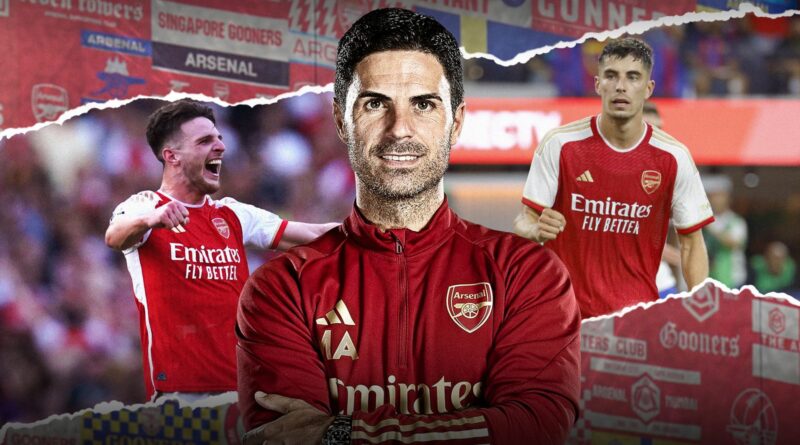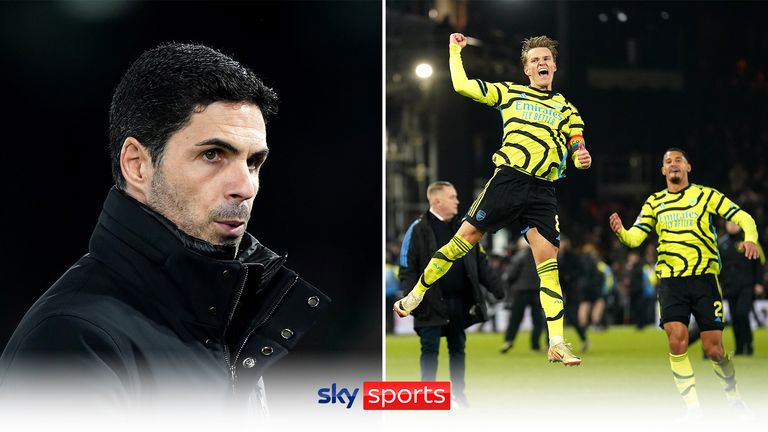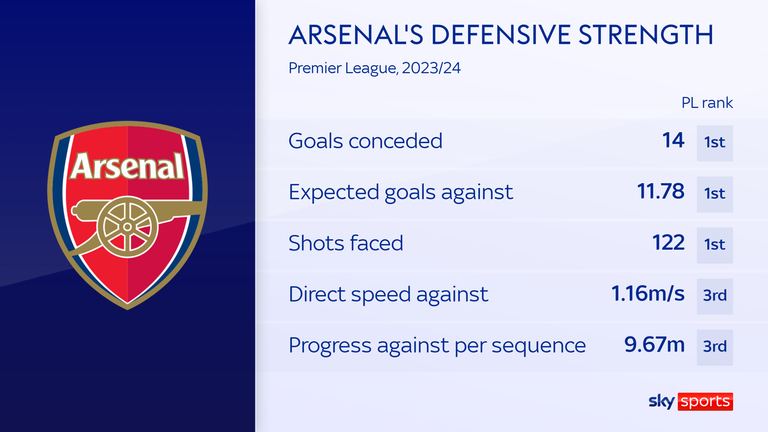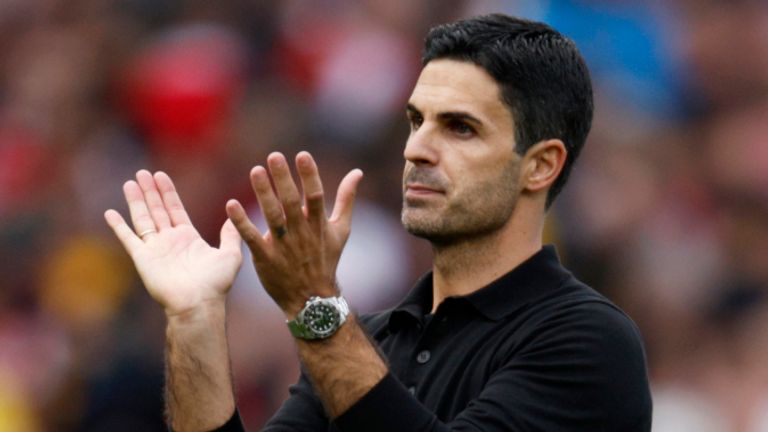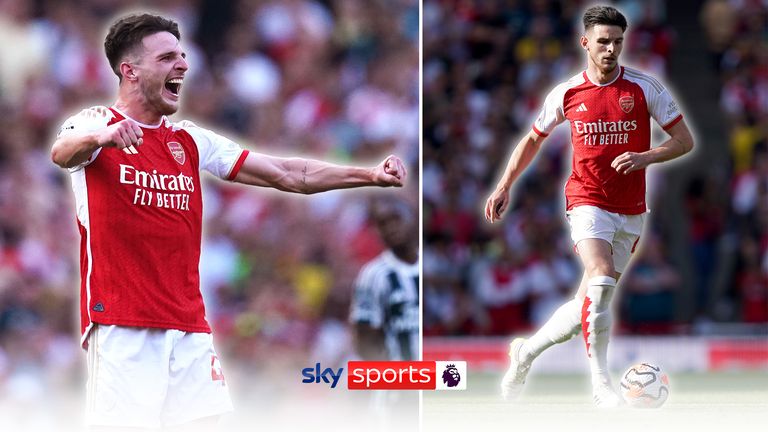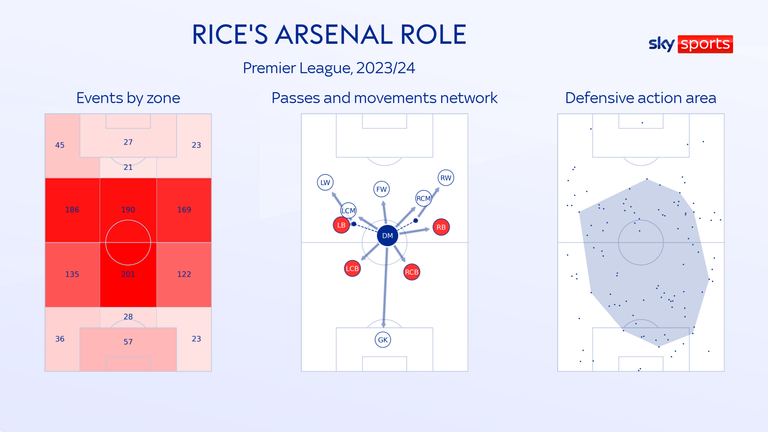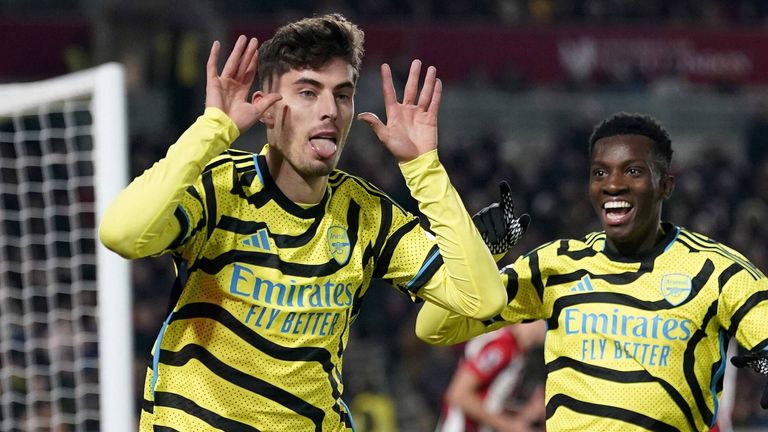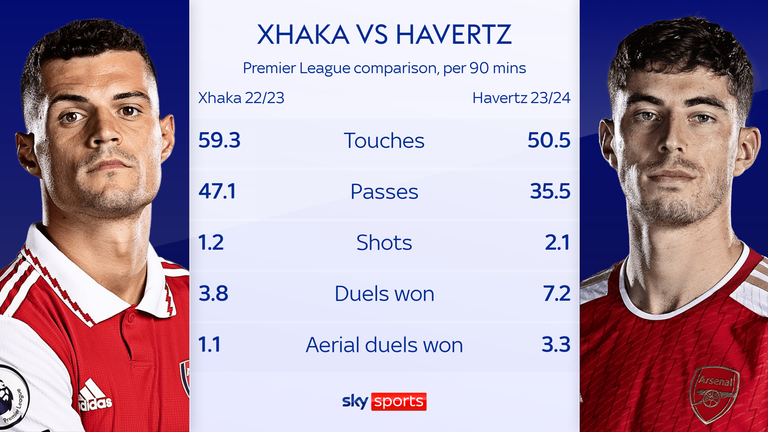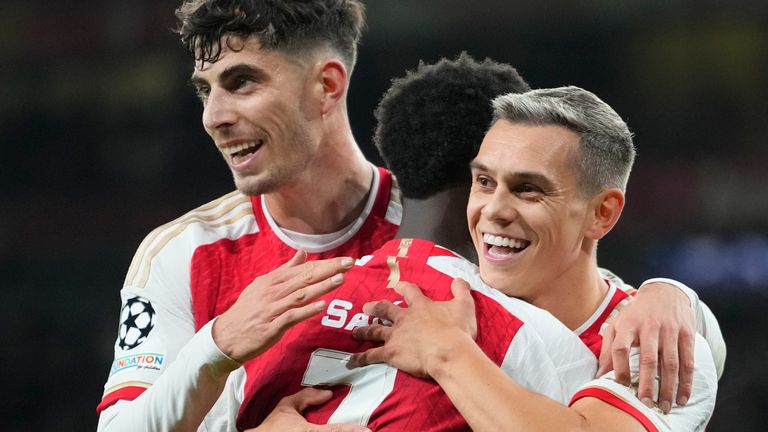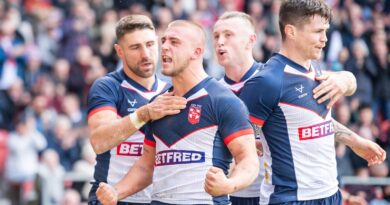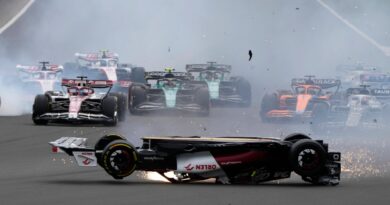Mikel Arteta exclusive interview: Declan Rice’s aura, Kai Havertz’s intelligence and why Arsenal’s best is yet to come
Mikel Arteta’s suspension means he will be confined to the director’s box at Villa Park on Saturday but he is focusing on the positives. “A really nice view,” he smiles. Besides, there isn’t much he would change about those delirious scenes against Luton.
“I think you get more from winning it in the way we did it,” he tells Sky Sports of the 4-3 victory at Kenilworth Road. “First of all, because you get to experience all that emotion and that feeling amongst the team. That is unique and that is the beauty of sport.
“And as well because you can take learnings from it, big learnings from what we did well and also the things we have to improve, to make sure we do not get into that position again.”
It helps, though, to know that, even if they do, this Arsenal side are capable of finding a way. Declan Rice’s header was one of several crucial late goals this season and another example of the winning mentality being carefully nurtured by their manager.
“It’s just about injecting that desire to win and understanding that the game is going to take you through certain phases and certain moments that you have to overcome,” says Arteta.
“When you are not at your best in certain areas, especially in your own box, you have to be excellent in other areas to earn the right to win it. Even at half-time, I felt the desire of the team to go out and do that in a really tricky and great atmosphere.”
An even more testing assignment now awaits against Aston Villa. Unai Emery’s side won a 14th consecutive home game with their dismantling of Manchester City on Wednesday night.
But Arsenal are in a good place too, top of the Premier League and fuelled by the pain of falling short last season. Arteta nods ruefully when asked if it still hurts. But lessons have been learned.
“One of them is that when you get to March, April, you need 24 players fully ready, all fit, at their best, because that is when the title is going to be decided,” he says. “We didn’t have that. We had some key injuries there that really affected the team.
“Then, it’s about grinding in certain moments, maintaining momentum when you have it and not giving anything away. To do that, you probably have to have the experience we had last year, to learn from it.
“It’s like a reference point but you have to look forward and that is the beauty of sport. You have it there, you can look at it from time to time, but it has to drive you even harder and in an even more convincing way that you can actually achieve what you want.”
Arteta has adjusted his side’s approach to maximise their chances, placing a greater emphasis on resilience and defensive solidity. Is this a more controlled Arsenal? He prefers a different word.
“More than control, I want dominance,” says Arteta. “Dominance in the right area and not allowing the opponent to breathe. This is what we do. Control in certain areas of the pitch, I’m not interested at all in that, because we can get in trouble by trying to do that.
“We want to dominate, we want to be a threat and we want the opponent to feel under pressure at all times.”
Arsenal have certainly succeeded on that front lately. The win over Luton, although an anomaly in its openness, made it six in a row in all competitions, during which they have scored 18 goals. There is a sense of a balance being struck between defence and attack.
“That is the art of the game – where that line is,” says Arteta. “It’s like when you have a blanket and your neck is cold, so you pull it up, but then your feet get cold and you want to do the opposite.
“It’s always a thin balance. Sometimes there are players that give you that. Sometimes it’s a formation. Sometimes it’s the experience or the game-state that gives you that. It’s an art. But a team has to be able to dominate to be really successful.”
How ‘unique’ Rice is helping
It is for that reason that Arsenal were willing to spend a record £105m on Rice in the summer. Arteta talked up the 24-year-old’s aura after his winner against Luton. But it is only one part of his offering. What are the other qualities Arteta values most highly?
“The way he dominates key aspects of the game,” he says.
“First of all, it’s the way he reads the game, his intelligence, his decision-making on and off the ball, when to pass the ball, how to pass it, where to look, how to execute, and the timing of that, which is very, very relevant, especially in his position.
“And then, there is the fact that he is able to read things before other players do, whether it’s in the middle of the pitch, or whether it’s in the opponent’s box. That is a big advantage.”
Arteta has been marvelling at Rice’s impact since the very start of the season. The Spaniard returns to a term he has used before when asked to sum up his influence on his team-mates.
“It’s something difficult to explain but if I had to put a picture, I would say a lighthouse. That is the feeling that I had with him when I was watching him play and when he was next to me.
“Even when he was playing at West Ham, I had that feeling that this guy has got a presence that is unique, he has got something else. I think the team needs something like that.”
Did he ever imagine, though, that he would be this good, this quickly? West Ham’s style of play could hardly be more different from Arsenal’s and yet Rice has adapted seamlessly. Arteta smiles.
“Through my imagination, every thought was extremely positive. Obviously, we knew he was going to be a very expensive player, but he is a player who was playing at a really high level already, so everything that I was trying to predict was extremely positive.
“Then, the outcome has been very, very quick and that is credit to him and how he has adapted, and also how everybody else has been extremely supportive and helpful with him.”
‘Intelligent’ Havertz starting to thrive
For Kai Havertz, a £65m signing from Chelsea, it has taken a little longer. His awkward start to the season frustrated supporters and Arteta admits it had a psychological impact on Havertz himself.
“I think everybody feels what is around them,” says Arteta when asked whether he had to lift him up. “When it’s not that positive, it can get to you. When it’s very positive, it can get to you too.
“But I think he felt the support of all his team-mates and his club behind him. And now, he is feeling the support of our people, which is extremely important and is something which can really amplify his potential. That is why I think now we are seeing a great version.”
Replacing Granit Xhaka in Arsenal’s midfield was never likely to be straightforward. “He was a huge player for us,” says Arteta. “We miss Granit, yes. I miss him as well because I love him as a person.”
But Havertz scored his third goal in four games in the win over Luton and it is not only him who has had to adapt. His manager has also had to figure out how best to utilise him.
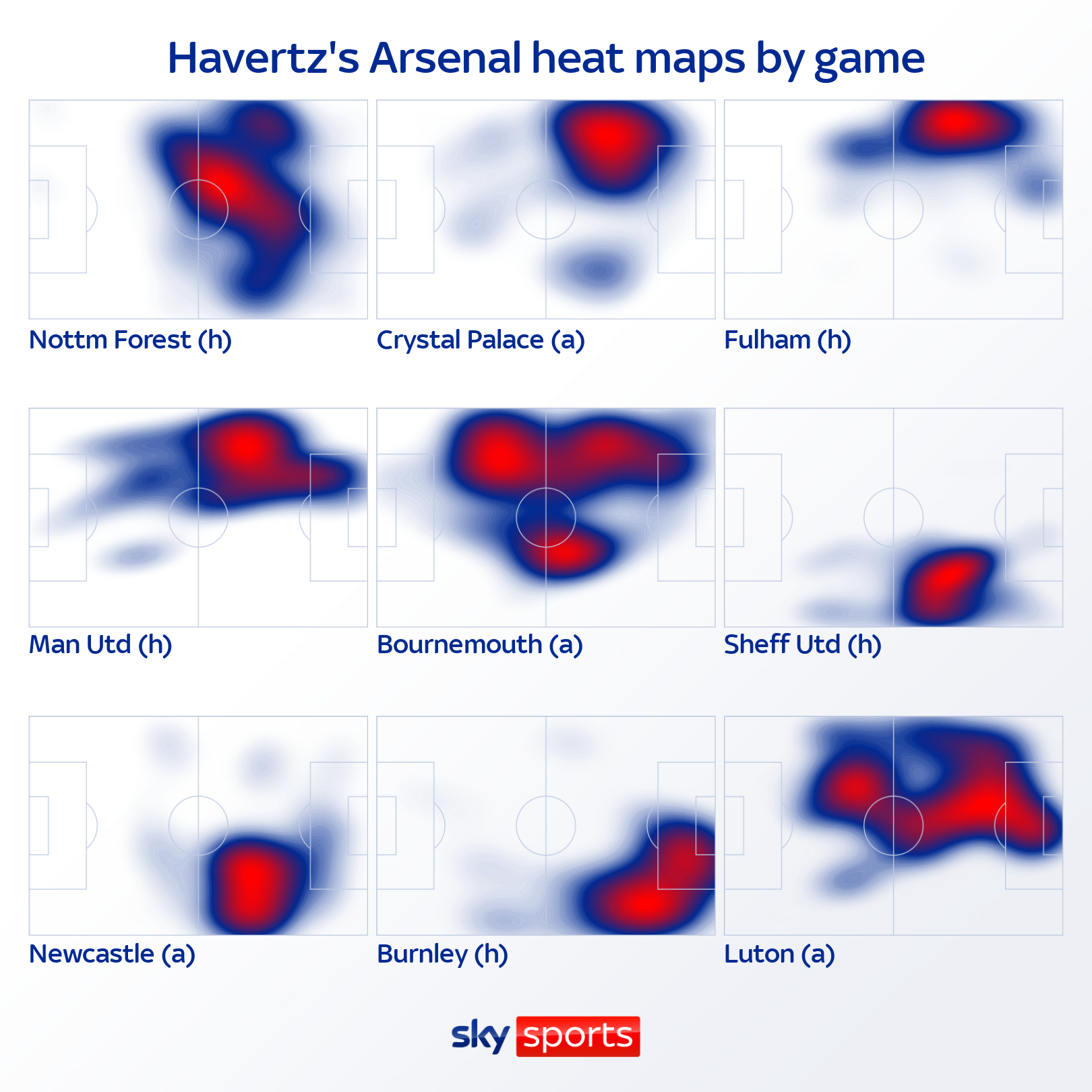
“We have to do that with every player,” explains Arteta. “We can’t just have one idea for what we want. In the end, we have to make that position, that role and the demands it has, fit the specific qualities of the player, to empower those qualities.
“If something is not working, we have to slightly change it and adapt it because, in the end, what we want is that he impacts the team in the most positive way. I think he needs to feel comfortable in order to deliver that.”
Certainly, Havertz looks comfortable now. He is a very different player to Xhaka but his performance against Luton – during which he created more chances, had more shots and won more duels than any of his team-mates – showed how effective he can be.
In addition to the height and physicality which gives Arsenal an outlet for direct passes, there is the off-the-ball movement evident both for his goal against Luton and the one scored by Gabriel Jesus, when Havertz dragged two defenders away from his team-mate.
“There is a big quality of his and it’s his football intelligence, how he reads the spaces, the timing of how he uses those spaces, how he moves in relation to his opponent,” says Arteta.
“It is very difficult to see that and, in my opinion, it is one of his best qualities.”
Why there’s more to come
Arteta will aim to harness those qualities at Villa Park but there is no guarantee Havertz will start. The debate around David Raya and Aaron Ramsdale continues to dominate but, even accounting for injuries, there is competition for places right across the squad.
Arteta feels there is scope for improvement too.
Arsenal look a more mature outfit than last season, steelier and tougher to beat, but they are the second-youngest in the Premier League. In fact, with an average age of 25 years and 11 days, their starting line-up is younger than it was last term.
“I am fully convinced we can get much, much better as a team and that we still have a lot of potential for a lot of individuals to reach another level,” says Arteta. “And they are hungry. They really want to do it and we have very good people to develop them.”
The next step in their evolution is obvious.
“First of all, we have to win major trophies,” says Arteta. “We haven’t done that. To do that, it’s about how consistently every day we behave, we train, we play and how we overcome difficult situations.
“Now, we have some very important injuries in the club and the team is still winning and playing and performing really well. That’s a big challenge for the team and the team is responding to that.
“So, it’s just about going over every hurdle, and in this league, you have some small ones and some huge ones that you have to overcome to be in the position you want at the end of the season.”
Whether they manage it remains to be seen. As Arteta said himself, Premier League titles are decided in March and April.
For now, it is just about Saturday at Villa Park, and about ensuring that – even if he cannot join in himself this time – Arsenal are the ones who end up celebrating.

